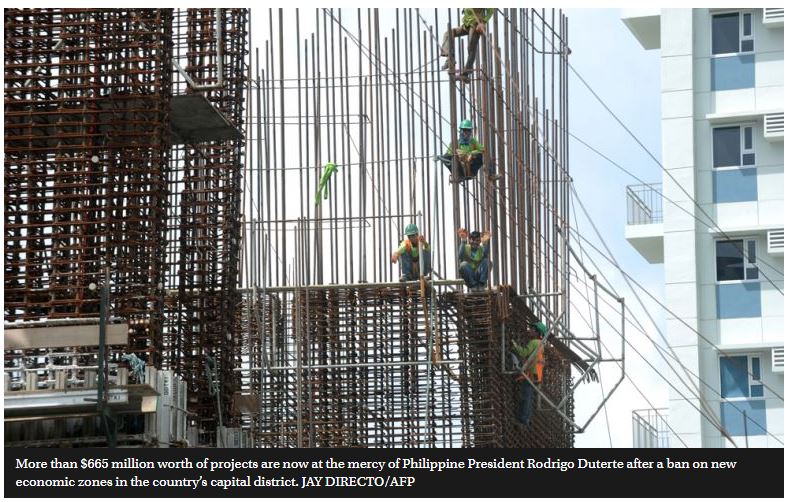Philippines: ‘Manila economic zone ban will hurt IT firms’
More than 34 billion pesos ($665 million) worth of projects to put up buildings for information technology and business process management (IT-BPM) companies are now at the mercy of Philippine President Rodrigo Duterte after the presidential Malacanang Palace slapped a ban on new economic zones in the country’s capital district.
According to the Philippine Economic Zone Authority (Peza), these represent the value of 22 Metro Manila-based projects awaiting final approval of Malacanang.
These refer only to the investment commitments that have been endorsed to the Office of the President before Administrative Order No 18 (AO 18) took effect.
In an effort to boost countryside development, AO 18 slapped a moratorium on new ecozones in Metro Manila starting on June 22, giving pending economic zone developers whose papers are in Malacanang about a month to iron out deficiencies in their submissions.
However, a bigger number of projects could be set aside by the ban, which caught Peza and the IT-BPM industry by surprise. The sector is more popularly known as the business process outsourcing (BPO) industry.
Missing the cut-off date
Peza earlier said there were still 131 Metro Manila-based projects that did not make the June 22 cut-off date, even though these had already been partially approved by Peza. The total value of these projects was not yet made available by Peza.
These pledges, according to Peza director-general Charito Plaza, were not yet endorsed to Malacanang because they first had to comply with requirements from other government agencies.
Talks of an ecozone moratorium have been ongoing as far as 2017.
Tereso O Panga, Peza deputy director-general for policy and planning, said they appealed to Malacanang as early as January last year to give a transition period of at least six months.
Trade and Industry Secretary Ramon Lopez told reporters that the policy was “really good”, given how Filipinos flock to Metro Manila in search of jobs.
While Peza is under the Department of Trade and Industry (DTI), the investment promotion agency and DTI do not always see eye to eye such as in the matter of rationalising fiscal incentives.
In the ban on new ecozones in Metro Manila, Lopez is supportive of even a shorter time frame, saying he might send a memo to Malacanang asking for a three-month transition period instead.
A sudden change in the direction of the industry is not as easy as it sounds, especially given these investment pledges were results of careful business planning among IT-BPM companies.
Panga had previously explained how Metro Manila served as the headquarters for these companies before they expanded to the countryside.
However, it seems the industry itself is also divided on the policy.
Rey Untal, president and CEO of the Information Technology and Business Process Association of the Philippines (IBPAP), said there might be a “near-term detrimental impact” on the industry, noting the need for a transition period.
On the other hand, the Contact Center Association of the Philippines (CCAP) did not show any sign of concern in their press statement last week.
CCAP, which has the biggest group of workers in the IT-BPM industry, said the order was “consistent with the intent” of the government’s push to rationalise tax incentives because of its effort to encourage industries to invest in the countryside.
“As an association representing an industry sector that benefits from fiscal incentives, CCAP, with its over one hundred member companies and over 850,000 employees, is supportive of moves to rationalise the incentive regime and make provincial locations attractive to investors,” the statement read. PHILIPPINE DAILY INQUIRER


 English
English




